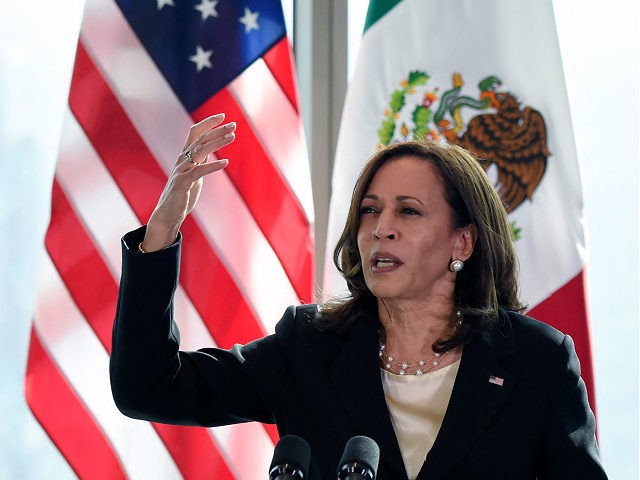Bilateral cooperation agreements reached between Vice President Kamala Harris and Mexican President Andrés Manuel López Obrador Tuesday largely ignored the pressing humanitarian crisis at the countries’ mutual border.
Instead, the agreements primarily focused on improving economic conditions in Mexico and addressing the “root causes” of migration from Central America.
The commitments made no mention of tackling the Biden administration’s overwhelmingly welcoming message for migrants that the Mexican president, known as AMLO, and his Salvadoran and Guatemalan counterparts believe is responsible for the border crisis.
The Biden administration has dismissed the concerns from the Latin American leaders who are essential to plugging the historic flow of migrants reaching the U.S.
Although the Biden administration insists the border is closed to non-essential travel, the new president is releasing illegal migrants into U.S. communities, often with no court dates due to the court backlog.
White House officials released a fact sheet on seven U.S.-Mexico bilateral cooperation commitments stemming from Harris’s meeting with the Mexican president. Harris’s visit to Mexico, following a stop in Guatemala, marked her first foreign trip as vice president.
The fact sheet is silent on the border crisis at America’s southern border, which Harris and her team are allegedly working hard not to be affiliated with because they reportedly believe it could be a political poison pill that may hurt her chances to run for president in the future.
It included seven commitments agreed to by both nations that have almost nothing to do with curbing migration, including helping southern Mexico create jobs, reducing economic inequality, and funding a loan program to support affordable housing and mortgages in the region.
Meanwhile, some Americans continue to struggle, feeling the economic impact of the Chinese coronavirus pandemic, particularly the large homeless population in California, which Harris represented as a U.S. senator.
President Joe Biden has tasked Harris with leading the White House response to the situation at the border and engaging in diplomacy with Mexico and the Central American Northern Triangle countries of Guatemala, El Salvador, and Honduras, the primary source of the influx of migrants.
However, Harris chose to only address the migration drivers in Central America and seemingly wants nothing to do with the border crisis. Analysts and experts say you cannot divorce one from the other to deal with both effectively.
Even the Democrat-allied CNN acknowledged early this month:
Former and current officials, along with immigration experts, stress that the causes of migration and the surge on the border are inextricably linked and argue that while addressing the reasons people decide to migrate to the US is critical, it can’t be divorced from what’s happening at the US-Mexico border.
Despite a bipartisan push, Harris has not yet visited the border.
The fact sheet failed to address critics’ — including AMLO and his government — and Republicans’ assertions that President Joe Bidens’ quick decision to rescind his predecessor’s strict border security and immigration policies soon after taking office is at fault for the border crisis.
Two agreements mentioned the border but did not say anything about combating the historic surge of predominantly Central Americans, including unaccompanied children and families, fueling the crisis at the U.S.-Mexico international boundary.
One agreement was holding cabinet-level security dialogue to discuss a shared vision for combating transnational criminal organizations. Those organizations, or drug cartels, maintain substantial control over smuggling groups.
The other agreement was to have law enforcement agencies from both counties partner up to combat “the shared priority of disabling human trafficking and human smuggling organizations,” the fact sheet noted, adding:
These groups prey on vulnerable individuals, falsely promising them safe passage or a good job in the United States in exchange for their savings. In fact, these organizations often use lies and threats to lure migrants into being trafficked or leave them stranded in Mexico or at the border, far from help and without basic supplies. Law enforcement agencies will work jointly to identify targets, develop investigations, and take enforcement actions such as freezing bank accounts associated with criminal groups.
While the Biden administration refused to call the situation at the border a crisis, Republicans traveled to the Rio Grande Valley sector in Texas, the epicenter of the influx of migrants, to warn that the new president’s lax border policies are resulting in the rapes of women and girls by human traffickers.
The Biden administration has made it easier for Central Americans to fill the coffers of smugglers by taking on debt to pay them for as many attempts as it takes to cross.
President Biden kept Trump-era border control protocols (Title 42) that allow the government to deport all migrants. However, migrants are only pushed across the border into Mexico, not back to their home countries thousands of miles away as was the policy under Trump.
From Mexico, migrants can make an unlimited number of tries at crossing the border because traditional penalties for repeat border crossers do not apply under Title 42.
The remaining U.S.-Mexico agreements dealt with improving economic conditions in Mexico.
One of the agreements focused on Harris’s favored assigned mission — addressing the “root causes” of migration in Central America.
“The governments of the United States and Mexico signed a memorandum of understanding to establish a strategic partnership to address the lack of economic opportunities in northern Central America,” it noted.
El Salvador, Guatemala, and Mexico have all blamed the Biden administration’s lenient border security policy for the migrant surge.

COMMENTS
Please let us know if you're having issues with commenting.